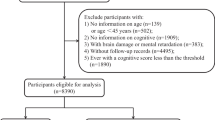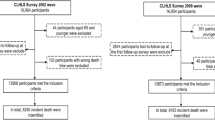Abstract
Background
Mild cognitive impairment (MCI) is a transitional stage of cognitive function between normal aging and dementia. Substantial variations in the prevalence of MCI in different countries have been studied including China. In this study, we established a prediction system to assess the risk of MCI among the elderly in China.
Methods
The Rothman-Keller model was conducted on the basis of the risk factors of MCI obtained by the combined results of a meta-analysis. The accuracy of the model was verified using actual population data.
Results
A total of 1826 subjects as a verification set were enrolled in this study in February 2019. There were statistically significant differences in the combined results of 10 risk factors including hypertension, diabetes, educational level, hyperlipidemia, smoking, physical exercise, living alone, stroke, drinking and heart disease (P<0.05). The area under the curve (AUC) of the actual data and the predictive results of this model was 0.859 (95%CI: 0.812–0.906, P<0.05), the sensitivity was 86.6% and the specificity was 76.5%.
Conclusions
This model performs an effective prediction that may be applied to the primary prevention for patients with MCI, helping to reduce the risk of MCI.


Similar content being viewed by others
References
Petersen RC, Smith GE, Waring SC, Ivnik RJ, Tangalos EG, Kokmen E. Mild cognitive impairment-clinical characterization and outcome. Archives of Neurology 1999;56(3):303–308.
Gauthier S, Reisberg B, Zaudig M et al. Mild cognitive impairment. Lancet 2006;367(9518):1262–1270.
Petersen RC, Thomas RG, Grundman M et al. Vitamin E and donepezil for the treatment of mild cognitive impairment. New England Journal of Medicine 2005;352(23):2379–2388.
Boyle PA, Buchman AS, Wilson RS, Leurgans SE, Bennett DA. Physical frailty is associated with incident mild cognitive impairment in community-based older persons. Journal of the American Geriatrics Society 2010;58(2):248–255.
Prestia A, Caroli A, van der Flier WM et al. Prediction of dementia in MCI patients based on core diagnostic markers for Alzheimer disease. Neurology 2013;80(11):1048–1056.
Petersen RC, Lopez O, Armstrong MJ et al. Practice guideline update summary: mild cognitive impairment: report of the guideline development, dissemination, and implementation subcommittee of the American Academy of Neurology. Neurology 2018;90(3):126–135.
Langa KM, Levine DA. The diagnosis and management of mild cognitive impairment a clinical review. Jama-Journal of the American Medical Association 2014;312(23):2551–2561.
Cheng YW, Chen TF, Chiu MJ. From mild cognitive impairment to subjective cognitive decline: conceptual and methodological evolution. Neuropsychiatric Disease and Treatment 2017;13:491–498.
Petersen RC, Roberts RO, Knopman DS et al. Prevalence of mild cognitive impairment is higher in men the Mayo clinic study of aging. Neurology 2010; 75(10):889–897.
Katz MJ, Lipton RB, Hall CB et al. Age-specific and sex-specific prevalence and incidence of mild cognitive impairment, dementia, and Alzheimer dementia in blacks and whites: A report from the Einstein aging study. Alzheimer Disease & Associated Disorders 2012;26(4):335–343.
Yaffe K, Middleton LE, Lui LY et al. Mild cognitive impairment, dementia, and their subtypes in oldest old women. Archives of Neurology 2011;68(5):631–636.
Sachdev PS, Lipnicki DM, Crawford J et al. Risk profiles for mild cognitive impairment vary by age and sex: the sydney memory and ageing study. American Journal of Geriatric Psychiatry 2012;20(10):854–865.
Dimitrov I, Tzourio C, Milanov I, Deleva N, Traykov L. Prevalence of dementia and mild cognitive impairment in a Bulgarian urban population. American Journal of Alzheimers Disease and Other Dementias 2012;27(2):131–135.
Juarez-Cedillo T, Sanchez-Arenas R, Sanchez-Garcia S et al. Prevalence of mild cognitive impairment and its subtypes in the Mexican population. Dementia and Geriatric Cognitive Disorders 2012;34(5–6):271–281.
Wada-Isoe K, Uemura Y, Nakashita S, Yamawaki M, Tanaka K, Nakashima K. Prevalence of dementia and mild cognitive impairment in the rural island town of Amacho, Japan. European Journal of Neurology 2011;18:545–545.
China home to 241 million people aged 60 or above. Chinadaily 2018. Available at: http://www.chinadaily.com.cn/a/201802/26/WS5a940fb4a3106e7dcc13e2a1.html
Honig LS, Vellas B, Woodward M et al. Trial of solanezumab for mild dementia due to Alzheimer’s disease. New England Journal of Medicine 2018; 378(4):321–330.
Fox C, Richardson K, Maidment ID et al. Anticholinergic medication use and cognitive impairment in the older population: the medical research council cognitive function and ageing study. Journal of the American Geriatrics Society 2011;59(8):1477–1483.
Visser PJ, Verhey F, Knol DL et al. Prevalence and prognostic value of CSF markers of Alzheimer’s disease pathology in patients with subjective cognitive impairment or mild cognitive impairment in the DESCRIPA study: a prospective cohort study. Lancet Neurology 2009;8(7):619–627.
Carson N, Leach L, Murphy KJ. A re-examination of Montreal Cognitive Assessment (MoCA) cutoff scores. International Journal of Geriatric Psychiatry 2018;33(2):379–388.
Nazem S, Siderowf AD, Duda JE et al. Montreal Cognitive Assessment performance in patients with Parkinson’s disease with “normal” global cognition according to Mini-Mental state examination score. Journal of the American Geriatrics Society 2009;57(2):304–308.
Rossetti HC, Lacritz LH, Cullum CM, Weiner MF. Normative data for the Montreal Cognitive Assessment (MoCA) in a population-based sample. Neurology 2011;77(13):1272–1275.
Rothman K, Keller A. The effect of joint exposure to alcohol and tobacco on risk of cancer of the mouth and pharynx. Journal of chronic diseases 1972; 25(12):711–716.
American Psychiatric Association. Diagnostic and Statistical Manual of Mental Disorders 5th edn. American Psychiatric Association 2013.
Zhuo CJ, Huang YQ, Liu ZR et al. A five-year follow-up study of mild cognitive impairment incidence in two urban and rural communities in Beijing. Chinese Mental Health Journal 2012;26(10):754–760.
Tan JP, Wang LN, Wang W. A case-control study of risk factors in mild cognitive impairment. Chinese Journal of Epidemiologyl 2006;27(1):55–57.
Sun ZW, Zhu XQ, Zhou JN. Vascular risk factors and cognitive impairment of mild cognitive impairment. Acta Universitatis Medicinalis Anhui 2007; 42(3):313–316.
Chang Q. Epidemiology and genetic background of cognitive impairment in the elderly in Beijing. Military Medical College of the Chinese people’s Liberation Army; 2007.
Xue ZL. The study of risk factors of mild cognitive impairment in community. Master. Shanxi Medical University; 2007.
Wang R. A case-control study on risk factors for mild cognitive impairment of veterans in certain selected Shaanxi areas. Master. Xi’an Jiaotong University; 2007.
Jiao FB, Tan JP, Wang LN. A case-control study on psychosocial risk factors for mild cognitive impairment in elders. Chinese Journal of Contemporary Neurology and Neurosurgery 2010;10(2):203–207.
Arsian B. A case-control study of risk factors in mild cognitive impairment. Master. Xinjiang Medical University; 2008.
Arsian B, Feng L. A comparative study on marriage and education level between Uygur elderly patients with mild cognitive impairment and normal elderly population. Xinjiang Medical Journal 2008;38(10):77–79.
Wang QQ. Effect of metabolic syndrome on mild cognitive impairment in the elderly. Master. Guizhou Medical University; 2010.
Chen SF. The relationship of plasma homocysteine, mild cognitive impairment and Alzheimer’s disease in Chenzhou. Master. University of South China; 2010.
Abdulwak A. Study of relationship between xinjiang uygur and han elderly mild cognitive impairment and plasmahomeyteine level. Master. Xinjiang Medical University; 2011.
Dong LM. The correlation between mild cognitive impairment and thyroid function in Xinjiang Uyghur and han population. Master. Xinjiang Medical University; 2011.
Jia HL, Song M, Yu L et al. Study on risk factors and protective factors of mild cognitive impairment in the elderly in Shijiazhuang community. The 9th National Symposium on Psychiatry of the Chinese Medical Association. Guangzhou; 2011:126–127.
Hui XP, Xu Y. A logistic regression analysis of risk factors for mild cognitive impairment in urban community of Suzhou. Journal of Clinical Medicine in Practice 2011;15(5):49–51.
Luo QQ. The relationship between MTHFR C677T gene polymorphism and vascular factors in the incidence of MCI. Master. Guizhou Medical University; 2011.
Lv XR. The effect of ApoE polymorphism in mild cognitive impairment. Master. Shanghai Jiao Tong University; 2011.
Wang QQ. Prevalence and risk factors of mild cognitive impairment in the elderly in Tianjin Community. Master. Tianjin Medical University; 2012..
Hai S, Dong B, Liu Y, Zou Y. Occurrence and risk factors of mild cognitive impairment in the older Chinese population: a 3-year follow-up study. International Journal of Geriatric Psychiatry 2012;27(7):703–708.
Zhong XL, Zhang ZY, Miao HJ, Zou T, Ailikemu, Zhou XH. Association between mild cognitive impairment and hypersensitive C reactive protein, interleukin-1 B and interleukin-6 in Xinjiang, China. Chinese Journal of Neurology 2013;46(11):763–768.
Lian GM, Zhu WB, Zhou DS, Liu WB, Xu Y, Chen ZM. Correlation between lifestyle factors and mild cognitive impairment in old adults. Chinese Journal of Rehabilitation Theory and Practice 2013(5):465–468.
Zeng YQ, Li LX, Wang Y. Related factors of mild cognitive impairment in elderly person: a case-control study. Hainan Medical Journal 2014(10):1427–1428.
Keyimu K, Zhou XH, Miao HJ, Zou T. Mild cognitive impairment risk factor survey of the Xinjiang Uyghur and Han elderly. International Journal of Clinical and Experimental Medicine 2015; 8(8):13891–13900.
Wang Y, Song M, Yu L et al. Mild cognitive impairment: vascular risk factors in community elderly in four cities of Hebei province, China. PLoS One 2015; 10(5):e0124566.
Xu SS, Tian XW. Risk factors of cognitive impairment in elderly patients with MCI. Chinese Journal of Practial Nervous Diseases 2015(7):49–50.
Chu ZH, Wang WJ, Han LZ, Wu L. The relationship between serum albumin, bilirubin and cognitive impairment in patients with mild cognitive impairment. The Journal of Practical Medicine 2015(17):2818–2821.
Xiao BC. Related factors of mild cognitive impairment occurrence. Journal of Clinical Research 2015; 32(12):2394–2396.
Wu TF. on Risk factors of mild cognitive impairment and folic acid intervention among the elderly in Tianjin communities: a case-control study. Master. Tianjin Medical University; 2016.
He Q, Li Q, Zhao J et al. Relationship between plasma lipids and mild cognitive impairment in the elderly Chinese: a case-control study. Lipids in Health and Disease 2016;15(1):146.
Wang F, Zhao M, Han Z et al. Association of body mass index with amnestic and non-amnestic mild cognitive impairment risk in elderly. BMC Psychiatry 2017;17(1):334.
Wang L, Wang F, Liu J, Zhang Q, Lei P. Inverse relationship between baseline serum Albumin levels and risk of mild cognitive impairment in elderly: a seven-year retrospective cohort study. The Tohoku Journal of Experimental Medicine 2018;246(1):51–57.
Feng X, Jiang FW, Ba XH. Correlation between normal thyroid function and mild cognitive impairment in the elderly. Chinese Journal of Gerontology 2017; 37(8):1904–1906.
Gao HH. Correlation between human plasma lipoprotein-associated phospholipase A2 (Lp-PLA2) and mild cognitive impairment. Master. Xi’an Jiaotong University Health Science Center; 2017.
Liu JX, Yang Q, Sun F, Wang SQ, Hu W, Liu R. Risk factors and multivariate analysis of elderly patients with MCI. Stroke and Nervous Diseases 2018; 25(2):197–199.
Ran F, Sun WM, Wang LY, Wang HG, Zhang Y. Correlation between serum uric acid level and mild cognitive impairment. Modern Instruments 2018;24(1):84–85, 94.
Shi Y. Study on the prediction model for influence factors of mild cognitive impairment. Master. Qingdao University; 2018.
Tang YL, Wei W, Wei J et al. Study on risk factors of mild cognitive impairment in Dahua Yao nationality. Clinical Research and Practice 2017;2(33):115–116.
Hu MY. The correlation between tobacco intake and mild cognitive impairment in the elderly. Master. Jilin University; 2018.
Wang H. Influence factors of mild cognitive impairment in urban of Northern China. Master. Chinese Center For Disease Control And Prevention; 2017.
Petersen RC. Mild cognitive impairment. New England Journal of Medicine 2011;364(23):2227–2234.
Manly JJ, Tang MX, Schupf N, Stern Y, Vonsattel JPG, Mayeux R. Frequency and course of mild cognitive impairment in a multiethnic community. Annals of Neurology 2008;63(4):494–506.
Afgin AE, Massarwa M, Schechtman E et al. High prevalence of mild cognitive impairment and Alzheimer’s disease in Arabic villages in Northern Israel: impact of gender and education. Journal of Alzheimers Disease 2012; 29(2):431–439.
Nasreddine ZS, Phillips NA, Bedirian V et al. The montreal cognitive assessment, MoCA: a brief screening tool for mild cognitive impairment. Journal of the American Geriatrics Society 2005;53(4):695–699.
Acknowledgement
This work was supported by Fund Project of Shanghai Science and Technology Commission (No. 16411972900).
Author information
Authors and Affiliations
Corresponding author
Ethics declarations
This research was approved by the Institutional Review Board of Shanghai First People’s Hospital Baoshan Branch (approval number: 2016Y02).
Additional information
Conflict of interest
All authors declare that they have no conflict of interest.
Rights and permissions
About this article
Cite this article
Wang, B., Shen, T., Mao, L. et al. Establishment of a Risk Prediction Model for Mild Cognitive Impairment Among Elderly Chinese. J Nutr Health Aging 24, 255–261 (2020). https://doi.org/10.1007/s12603-020-1335-2
Received:
Accepted:
Published:
Issue Date:
DOI: https://doi.org/10.1007/s12603-020-1335-2




